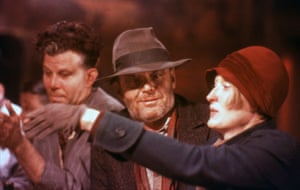READING GROUP
From a fortune cookie to a Pulitzer: the story behind William Kennedy's Ironweed
Ironweed’s hero navigates the Great Depression in a drunken haze, but his journey is lit by glowing writing about love, friendship and redemption
Sam Jordison
Tue 10 Apr 2018
When the Paris Review interviewed William Kennedy in July 1984, he had just installed a new swimming pool outside his house. Six months earlier, he’d opened a fortune cookie that said he was going to have a lucky week. He’d assumed it was because “I was getting reviewed in about five different major places” – but that wasn’t the half of it. A man (called, pleasingly, Dr Hope) called Kennedy and told him he’d won a MacArthur Fellowship – then $264,000 (these days it is a hefty $625,000). That same year, Kennedy would win the Pulitzer prize for Ironweed, sold the film rights (as well as truck-loads of copies) and received almost universally glowing reviews around the world.
Things were suddenly going well for Kennedy, but overnight success had been a long time coming. When Ironweed was published, Kennedy was deep into his 50s. His first two novels had gone out of print. Ironweed, meanwhile, had been rejected by 13 publishers. For years, Kennedy said, he had felt like Joe Btfsplk, a character in a popular 1970s cartoon “who went around with a cloud over his head”.
But by the 1980s, Kennedy was well inured to literary hardship; before his first novel was published, he’d had 30-odd short stories rejected by magazines all over America. He later explained that he’d only kept going because a rejection slip from The Atlantic had praised his style. His work ethic was praiseworthy too; he wrote solidly for 12 years, honing his craft with a creative writing teacher in Puerto Rico until, in 1962, his teacher told him he had finally produced something “publishable”.
Kennedy’s teacher was Saul Bellow, who later read Ironweed, and, upon hearing that Viking had turned it down, took it upon itself to shame them. (Bellow frightened them so much they also rereleased Kennedy’s first two novels.) Glowing reviews, prizes and the pool followed.
Superficially, you could forgive publishers for passing, on the grounds that Ironweed sounds like a hard sell. Kennedy himself suggested as much to the Paris Review: “People had decided it was a depressing book, set in the Depression, about a bum, a loser, a very downbeat subject. Who wants to read a book about bums?”
But Kennedy, an admirer of John Steinbeck, knew just how popular “bums” could be, and that his book was about so much more, as he told the Paris Review: “It’s a book about family, about redemption and perseverance, it’s a book about love, faded violence, and any number of things. It’s about the Irish, it’s about the church...”
It’s also about us. We aren’t so different from Francis Phelan, give or take a few bad breaks and unlucky decisions. Ironweed shows vividly what it means to live on the fringes. Francis is a haunted man, forced to commune with the ghosts of the victims of his violence and clumsiness; one of these his own baby, dead at 13 days old after Francis dropped him. Add some filth, sexual disgust and bodily collapse and you could almost forgive those publishers for finding Ironweed depressing – if they weren’t so absolutely wrong.
Ironweed is almost euphoric from the get go. There is joy and consolation among the horror and tragedy, starting on the very first page when Francis rides through a cemetery on the back of a “rattling old truck” towards his parents’ graves:
Francis’ mother twitched nervously in her grave as the truck carried him nearer to her; and Francis’s father lit his pipe, smiled at his wife’s discomfort, and looked out from his own bit of sod to catch a glimpse of how much his son had changed since the train accident.
Kennedy gives us light amid the darkness. I’d be tempted to go into extravagant raptures about this golden alchemy, but fortunately a critic called Donald Newlove felt the same way back in the 1980s and described the glow of Ironweedso beautifully I don’t need to:
I, for one, enter the heaven of a writer absolutely on top of his material from the first sound of his voice. His load is light, every page. Pure light. And surely he changes our lives, enriches our understanding of the madness of one drunk in a fellowship of rock-bottom boozers during the Great Depression. It’s not just historical understanding he gives us. We become Francis Phelan, a deep-witted walking grave, lighted up with family ghosts like fireflies in twilight.
He’s right. It’s wonderful. Kennedy deserved that swimming pool, just as he deserves to be read and admired today.






No comments:
Post a Comment